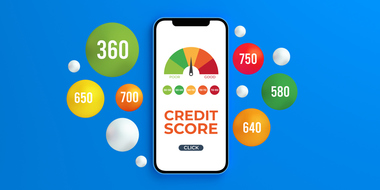Posted in Triplett & Carothers on May 4, 2022
Your credit score represents your creditworthiness. A good credit score can help you start a business or get a car loan. However, it also affects many facets of your financial life.

- It’s not a complex process, but it is absolutely vital for your financial picture. When you have either a very good credit score or an excellent credit score, it will cost you less to borrow money than if you have a bad credit score. That’s because lenders will see you as a trustworthy borrower. As such, they are more likely to offer you more favorable rates.
- A good score grants you near-immediate access to rewards on credit cards that offer cashback opportunities, travel perks, and protection on major purchases.
How does the credit scoring process work?
Additionally, how is your score calculated? Is it possible to establish and maintain good credit? The answers to these questions are below:
- A good credit score falls within a range of 300 to 850, where 300 is viewed as a very poor score and 850 is regarded as an excellent score. There are various different credit scoring models, though FICO and VantageScore are the two most popular models. The three credit bureaus—Experian, Equifax, and TransUnion—calculate credit scores by using the two aforementioned credit scoring models.
- What’s an excellent credit score? With the FICO scoring model, an excellent score is one that falls between the range of 800 and 850. With VantageScore, an excellent score has a wider range, falling between 781 and 850.
- The better the credit cards, the higher the credit score requirement. That is because a good score reaps many benefits and deals in your favor. The better your score, the better your chances of being approved for credit cards of this nature. Also note that card issuers look at income above all, but monthly payments are viewed as well in determining your eligibility.
- According to Experian, when FICO calculates your score, this scoring model also takes the following information into consideration:
- Your payment history, or whether you pay your bills on time, constitutes 35% of your total credit score.
- Also known as your credit utilization rate, the number of accounts you owe, or the total credit and loans you are responsible for compared to your total credit limit, accounts for 30% of your final credit score.
- FICO looks at your credit history, which is a time-focused record of how you have managed credit since opening your first credit card. Credit history accounts for 15% of your credit score.
- New credit, or how often you apply for and open new credit accounts, constitutes 10% of your credit score with FICO.
- Last but not least, you credit mix, or the variety between installment loans and revolving credit accounts, makes up 10% of your credit score calculation.
Obtaining access to your credit score can be tricky
Some credit card issuers, like Citi and Discover, provide free FICO scores to people who have credit cards with these issuers, while other issuers, including Chase and Capital One, offer free access to VantageScore credit scores.
You can get a free credit report from each of the three major reporting bureaus each year, though keep in mind that your credit report is different from your credit score alone. You may access your report through AnnualCreditReport.com, though sometimes, such as during the pandemic, people have been able to obtain their credit report more frequently as a courtesy.
How to build good credit
Make sure you align your actions with your goals. This can take the shape of always paying your bills on time and keeping your credit utilization ratio as healthy as possible. Another option is to ask someone you know if they would allow you to be an authorized user on his or her credit card. Not only is this a low-risk option, but it will also allow you to increase your credit score over time, which is the ultimate goal.
You can also improve your credit score by simply paying your monthly bills on time, including submitting utility payments and and paying your cell phone usage bill in a timely fashion. If you’re already on top of your payments and ensure that you make them on time, feel free to contact Experian Boost, which is one of many ways to elevate your credit score.
In fact, some people who reached out to Experian Boost have witnessed an impressive increase of approximately 10 points. Additionally, you may also think to increase your credit score by opening and activating a student card at college.
Some college student card lenders are lenient when it comes to credit history requirements, as they understand many people seeking this type of credit opportunity are eager to increase their credit score and credit history alike. You must be at least 18 years old to apply for a student card through a college. Many lenders of this nature require that you have a steady income stream as well.
On-time payments are yet another important factor in calculating your FICO score, if not the most important. Maintaining a low credit utilization rate is next in line in terms of importance, as is your payment history. Do your best to minimize the number of new credit applications that you submit. Taking such a simplistic action towards improving your credit score may help you lower your score by five points with ease.
Get into the habit of paying attention to your credit score and taking measures to improve it overall. By doing so, you will significantly impact your financial health, both now and in the long run.
Reach out to Roz Carothers and her team at Triplett & Carothers to learn more.
©2022

